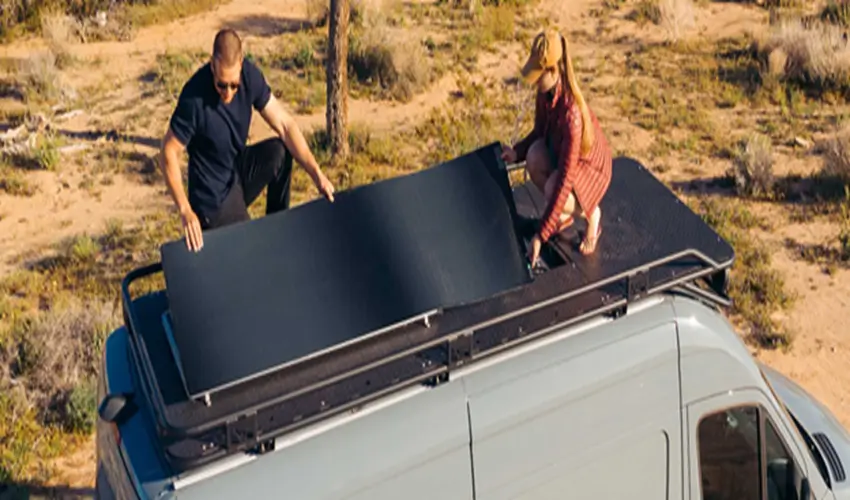
Powering Freedom: How RV Solar Panels Are Changing Life on the Road
Traveling by RV has long represented freedom—freedom to explore, to unplug from routine, and to spend more time in nature. But as that lifestyle becomes more popular and more people choose to live or travel full-time in their vehicles, one key challenge always comes up: power. How do you stay connected, keep your fridge running, or charge your devices when you’re miles away from the nearest electrical hookup?
That’s where RV solar panels have stepped in—not just as a trend, but as a real, long-term solution for powering life on the road. With advances in solar technology, even lightweight options like a 200W flexible solar panel can provide enough energy for essential needs without the noise or maintenance of a generator.
Why Solar Power Makes Sense for RVs
For anyone who’s spent time RVing off-grid (also known as boondocking or dry camping), power management becomes a daily concern. Traditional setups often rely on generators or require frequent stops at campgrounds with hookups. These solutions work, but they come with trade-offs—fuel costs, noise, emissions, and limited access to remote locations.
RV solar panels offer a cleaner, quieter, and more sustainable alternative. Once installed, they provide free energy from the sun—no fuel, no noise, and minimal maintenance. They allow RVers to stay off-grid longer, travel more freely, and reduce dependence on crowded campsites.
How RV Solar Panels Work
The concept is simple: solar panels capture sunlight and convert it into electricity. That power is then stored in batteries and used to run appliances, lights, fans, or charge devices. A charge controller regulates the flow of electricity to prevent overcharging, and an inverter converts the stored energy into usable AC power for common electronics.
In an RV setup, solar panels are typically mounted on the roof, though portable and flexible options offer more versatility for irregular surfaces or mobile setups.
The Benefits of Going Solar on the Road
1. Freedom to Camp Anywhere
Solar power opens the door to camping in more remote or scenic locations—national forests, deserts, beaches—without worrying about finding hookups. For those who value solitude or adventure, it’s a game-changer.
2. Reduced Environmental Impact
Using solar energy reduces reliance on fossil fuels and cuts down on noise and air pollution. It’s a step toward more sustainable travel, especially for those who spend months or years living on the road.
3. Quiet Operation
Unlike gas generators, solar panels operate silently. This makes early mornings or peaceful evenings at a campsite more enjoyable for you—and your neighbors.
4. Lower Long-Term Costs
While there’s an upfront investment, solar power can reduce long-term energy costs by eliminating the need for constant generator use or paid hookups.
The Rise of Flexible Solar Panels
One of the more recent developments in mobile solar tech is the introduction of flexible panels—especially practical for RVs, vans, and boats. A 200W flexible solar panel provides significant power output while being lightweight, thin, and bendable. This makes it easier to install on curved or irregular surfaces where traditional rigid panels wouldn’t fit.
Some key advantages of flexible panels include:
- Lightweight Design: Easier to handle and install, with less strain on your vehicle’s roof.
- Low Profile: Aesthetically subtle and aerodynamic, reducing drag while driving.
- Durability: Many flexible panels are built to withstand weather, vibration, and long-term UV exposure.
- Easy Storage or Relocation: Ideal for users who want portable or semi-permanent setups.
A 200W system is often enough to run basic RV appliances, charge phones and laptops, or even power small medical devices—especially when paired with a good battery setup.
What to Consider When Choosing a Solar Setup
Before diving into solar, it’s worth thinking about your energy needs. Ask yourself:
- How many devices or appliances do you need to power?
- Will you be camping in sunny areas or shaded forests?
- Do you want a permanent or portable setup?
- What kind of roof space or mounting options do you have?
Combining several smaller panels—or supplementing a fixed setup with a portable 200W flexible solar panel—can offer the best of both worlds: consistent base power and extra energy when needed.
A Shift Toward Self-Sufficiency
More people are seeking independence in how they live and travel. Whether it’s part-time adventuring or full-time van life, solar power plays a major role in enabling that shift. It’s no longer just for tech-savvy travelers or hardcore off-gridders—RV solar is becoming the norm for anyone looking to extend their trips, reduce their footprint, and gain more control over their journey.
Final Thoughts
The open road offers endless possibilities, but staying powered along the way can be tricky without the right tools. RV solar panels, especially efficient and adaptable options like a 200W flexible solar panel, provide a smart, eco-friendly way to meet your energy needs without sacrificing mobility.
It’s not about luxury—it’s about practicality. Solar makes life on the road simpler, quieter, and more sustainable. And for many RVers, once you’ve gone solar, there’s no looking back.